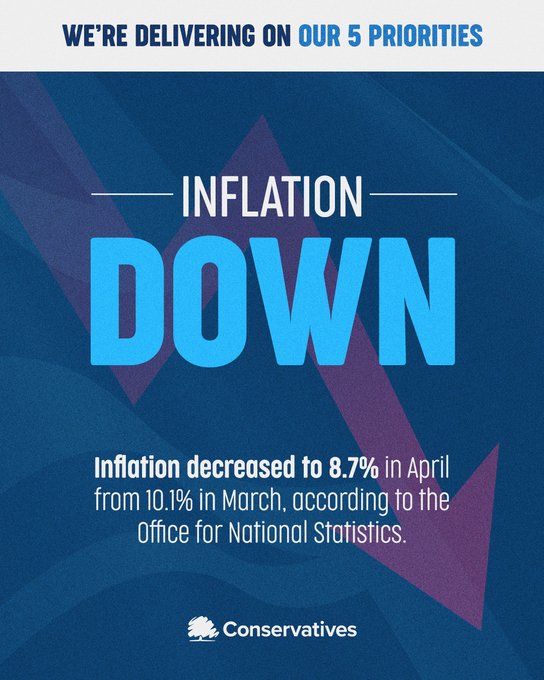Inflation figures
Today the Office for National Statistics published inflation figures showing that the rate of increase in prices has dropped back to single figures, falling by 1.4 percentage points to 8.7 per cent.
- Economies around the world are facing high inflation driven by Putin’s illegal war, higher energy prices and economies bouncing back from the pandemic. This means the costs of goods have risen.
- That is why one of the five key Conservative promises is to halve inflation by the end of the year. The ONS confirmed this morning inflation has fallen to 8.7 per cent, showing we are making progress towards our target, but there is more work to do.
- Inflation is the number one enemy that makes everyone poorer, eating away at people’s savings and pay packets. By reducing it we are easing the impact of day to day costs on people's pockets as we grow the economy and reduce debt.
The Conservative government is making progress against inflation and taking action to help people with the cost of living by:
- Reducing inflation to 8.7 per cent today, showing progress on our promise to halve inflation by the end of the year. The rate of inflation is the change in prices for goods and services over time and rises when things get more expensive. Today the ONS confirmed the headline rate of CPI (inflation) stood at 8.7 per cent, a 1.4 per cent decrease, reaching single figures for the first time since August 2022.
- Paying half of people’s energy bills over the winter reducing one of the biggest outgoings for families and tackling inflation head on. Putin’s war in Ukraine is driving energy prices up across the globe which, in turn is driving up the rate of inflation and therefore the cost we pay for day-to-day goods. We paid half of people’s energy bills this winter, which kept inflation four percentage points lower.
- Freezing fuel duty, holding down the price of fuel for motorists and therefore helping us to reduce inflation. By reducing the cost people pay for their fuel we are holding down energy prices and therefore preventing inflation from spiralling - the rise in the cost of energy is the single biggest driver of the rise in the cost of food. At the Spring Budget 2023, we delivered the thirteenth consecutive freeze to fuel duty, saving motorists £200 since the five pence cut was introduced.
- Maintaining a strong workforce, with unemployment near record lows, whilst delivering a labour market package to get more people into work. The unemployment rate is near record lows, with the number of payrolled employees higher than pre-pandemic levels. This means more people are contributing to the economy, without an unreasonable reliance on the state – allowing us to tackle inflation.
- Managing responsible public finances and resisting above-inflation pay rises, allowing the Bank of England to navigate global headwinds such as inflation. The Bank of England welcomed the steps we have taken to stabilise public finances, including avoiding agreeing above-inflation pay rises across the public sector – meaning they were able to predict inflation to halve by the end of the year.
- Easing the impacts of inflation immediately with a £94 billion package of cost of living support. Inflation is the number one enemy that makes everyone poorer. As we make progress to halve the rate of inflation by the end of the year we have a £94 billion package of cost of living support in place – an average of £3,300 per household on average. This includes additional payments to vulnerable households.

Comments
to help with the rising costs of energy effectivly the way electricity is priced needs be sorted. No matter how its produced its price is based on the price of Gas as its the "last unit to market". ALL energy prices are sky high and we have big energy companies announcing record shattering profits.
Its one of those situations where "the energy price system is broken and needs to be fixed" isnt really true, it would be better to say "The energy price system is working exactly as intended and needs to be destroyed"